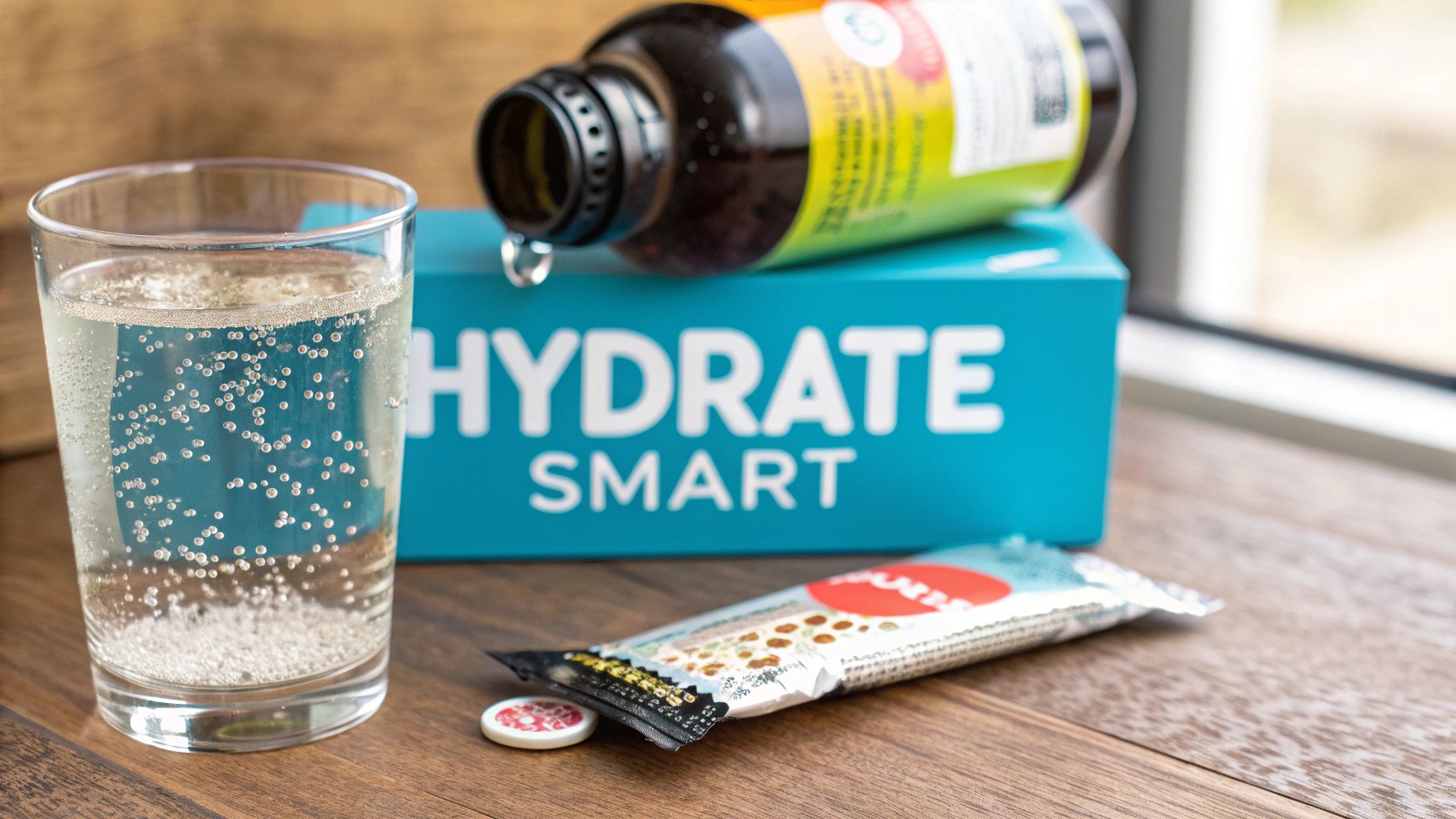

· By Annemarie
Dehydration After Alcohol Consumption: Causes & Recovery Tips
We’ve all been there. A great night out, plenty of drinks, and then you wake up feeling like you spent the night trekking through the Sahara Desert. It feels backward, doesn't it? You were drinking liquids all night, so how on earth could you be so dehydrated?
It’s not just in your head—it’s a very specific biological chain reaction. Let's break down exactly why alcohol makes you so incredibly thirsty.
Why Alcohol Makes You So Thirsty
Think of your body’s hydration level as being managed by a very strict foreman in your brain. This foreman uses a hormone called vasopressin, also known as the Antidiuretic Hormone (ADH), to tell your kidneys when to hold onto water and when to let it go. Under normal circumstances, ADH keeps everything in perfect balance.
The Hormone Hijacker
But when alcohol enters the scene, it’s like a hijacker taking over the control room.
Ethanol, the active ingredient in your favorite drinks, directly suppresses the release of ADH. Without its foreman shouting instructions, your kidneys get the wrong signal. They stop reabsorbing water and instead open the floodgates, sending precious fluid straight to your bladder.
This is the real reason you’re making so many trips to the bathroom after a few drinks. It’s not just the volume of what you’re drinking; your body is actively being tricked into flushing out its own water reserves. This powerful diuretic effect is the root cause of dehydration after alcohol consumption.
To put it into perspective: for every 200ml of beer you drink (about one glass), your body can flush out around 320ml of water. You’re losing more fluid than you’re taking in, creating a deficit that quickly snowballs into dehydration.
This simple but powerful process is what sets the stage for that dreaded morning-after feeling.
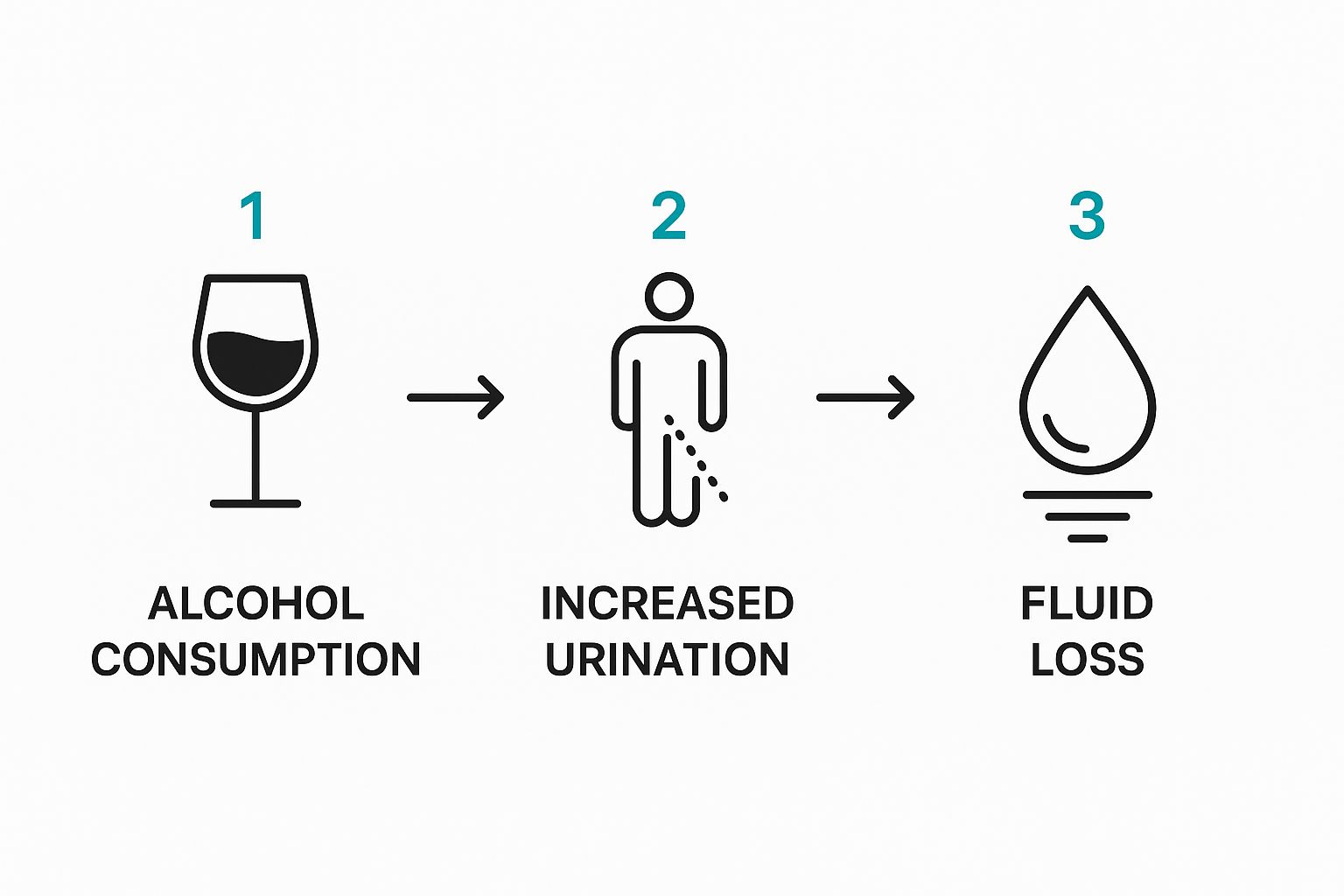
As you can see, the cycle is swift and direct, paving the way for those all-too-familiar hangover symptoms like headaches, fatigue, and that raging thirst. If you want to dive deeper, you can explore our full guide on how alcohol dehydrates you.
To make it even clearer, here’s a quick rundown of what’s happening inside your body.
How Alcohol Causes Dehydration At a Glance
| What Happens | The Scientific Reason |
|---|---|
| You drink alcohol. | Ethanol enters your bloodstream and travels to the brain. |
| A key hormone gets blocked. | Alcohol suppresses the release of vasopressin (ADH). |
| Your kidneys get the wrong signal. | Without ADH, your kidneys stop reabsorbing water. |
| You start urinating more. | Your body flushes out more fluid than you're consuming. |
| You become dehydrated. | This net fluid loss leads to classic hangover symptoms. |
So, when you wake up feeling parched, it’s your body sending out a desperate SOS for the water it was tricked into losing. Understanding this is the first step toward fighting back and making sure your next morning is a whole lot brighter.
So, How Do I Know If I'm Dehydrated After Drinking?
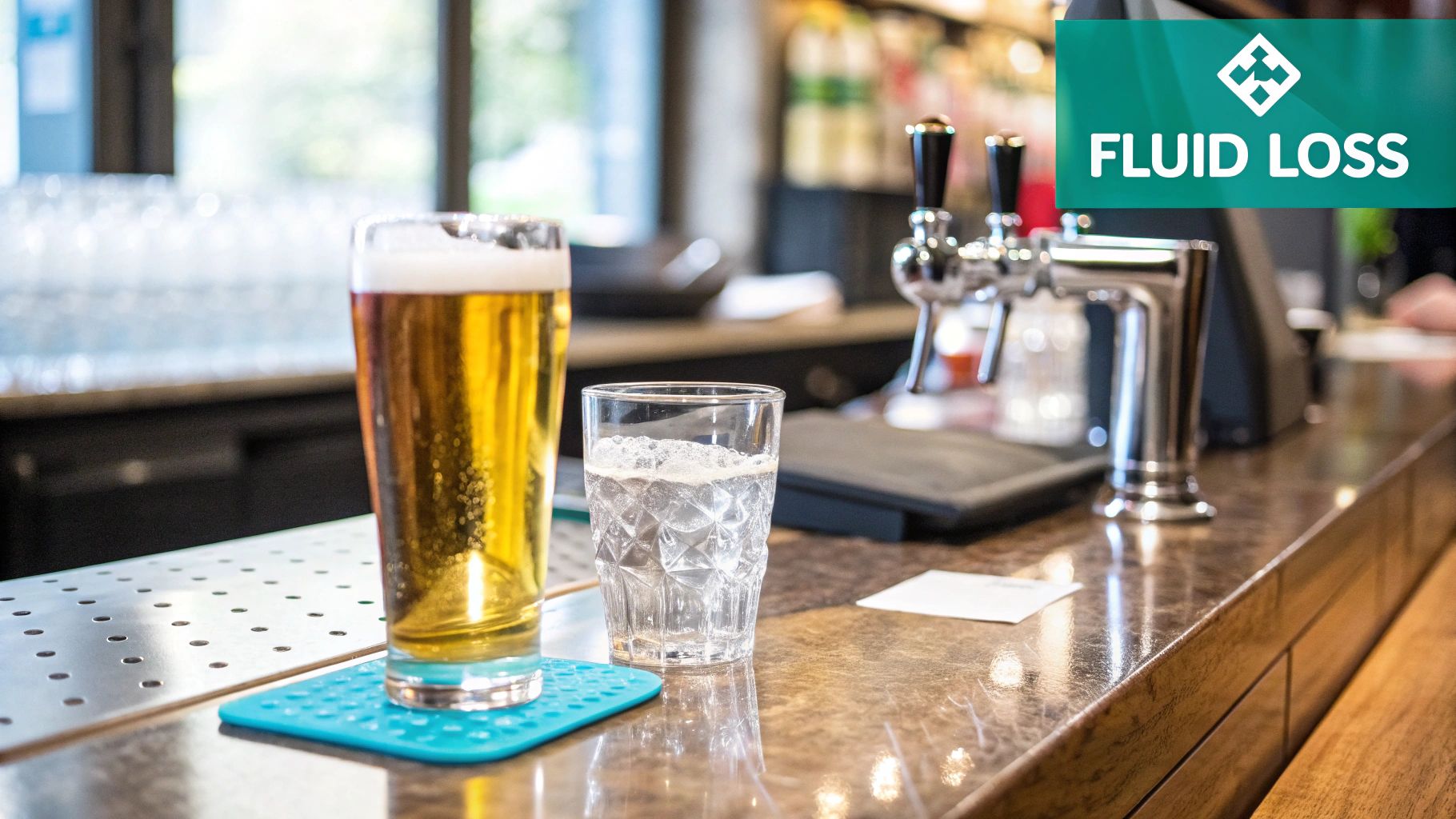
The morning after a fun night out often feels… confusing. You know you’re not quite right, but it’s so easy to just blame it on a bad night's sleep or general exhaustion. But here’s the thing: the real culprit behind most of those classic hangover feelings is dehydration.
Sure, being thirsty and having a mouth as dry as the Sahara are the most obvious clues. Your body, however, sends out a whole bunch of other distress signals when it's low on fluids. Learning to spot these less-obvious signs is your first step to a quicker, better recovery. Think of them as your body's way of saying it needs more than just a nap—it needs water, and fast.
The Obvious Physical Signs
When your body is running on empty fluid-wise, its most basic functions start to struggle. This fluid shortage shows up in ways that can make you feel genuinely sick, and it goes way beyond just being thirsty.
The most common physical signs of dehydration after drinking include:
- A Pounding Headache: When you're dehydrated, your brain tissue can actually shrink a bit from the fluid loss. This causes it to pull away from your skull, triggering that signature throbbing pain of a hangover headache.
- Dizziness and Feeling Lightheaded: Not having enough fluid in your system can make your blood pressure drop. That's why you feel so unsteady on your feet, especially when you stand up a little too fast.
- Muscle Cramps or Weakness: All that extra peeing doesn't just get rid of water; you lose crucial electrolytes like potassium and sodium, too. Without them, your muscles can’t function properly, leading to those awful cramps and that general feeling of weakness.
- Total Fatigue and Lethargy: Your body needs water to create energy. Period. Without enough of it, everything slows to a crawl, leaving you feeling completely wiped out.
These aren't random symptoms; they're the direct result of the fluid and electrolyte mess that alcohol creates.
The Sneaky Mental and Emotional Signs
Dehydration doesn't just hit you physically. It also does a number on your mental clarity and your mood. Considering your brain is about 75% water, even a small drop in hydration can seriously mess with its performance.
Dehydration straight-up impairs your cognitive function and mood. That means the irritability, brain fog, and trouble concentrating aren't "all in your head"—they're real, physiological responses to not having enough water.
Keep an eye out for these mental and emotional red flags:
- Brain Fog or Trouble Focusing: A dehydrated brain has a hard time with memory, focus, and clear thinking. Suddenly, even the simplest tasks can feel like climbing a mountain.
- Irritability and Mood Swings: When you're low on fluids, it messes with the transport of hormones and neurotransmitters. The result? You might find yourself feeling extra cranky or emotionally sensitive.
- A Spike in Anxiety: For some people, being dehydrated can actually trigger feelings of anxiety or unease, piling right on top of the "hangxiety" that can sometimes follow a night of drinking.
Once you learn to connect the dots—linking that headache, the brain fog, and the exhaustion to dehydration—you can stop just waiting for the misery to end. You can take action, rehydrate properly, and start the journey back to feeling human again.
The Long-Term Health Impact of Frequent Dehydration
We tend to think of a hangover as a one-day affair. You feel awful, you recover, and you move on. But what happens when that becomes a regular part of your weekend? It’s easy to dismiss hangovers as just a temporary inconvenience, but that view misses the bigger, more critical picture.
Every time you're hungover and dehydrated, you're putting your body under a tremendous amount of stress. Over time, that stress adds up.
Think of it like running a car's engine without enough oil. It might work for a little while, but sooner or later, critical parts are going to wear down. This cycle of fluid loss and replenishment puts a heavy strain on some of your most vital organs, turning a simple "bad morning" into a serious wellness concern.
The Cumulative Toll on Your Body
Imagine each bout of alcohol-induced dehydration as a tiny injury. One on its own isn't a big deal. But when those injuries happen again and again, over months and years, the recurring stress starts to manifest in some pretty damaging ways. We’re talking about everything from your internal organs to how you look.
This isn't just some minor issue; it's a global health problem. Alcohol's impact is staggering, contributing to over 2.6 million deaths a year, which is 4.7% of all deaths worldwide, according to a 2019 report. While that number covers a wide range of alcohol-related harms, the complications from chronic dehydration play a massive role. You can dig into more of the data on the global impact of alcohol straight from the World Health Organization.
This repeated strain forces your body to work overtime, speeding up the kind of wear and tear you might not even notice until the damage is already done.
Key Areas of Long-Term Risk
The fallout from chronic dehydration goes way beyond a pounding headache and a dry mouth. Let's get into some of the key systems that really take a hit from repeated episodes of post-drinking fluid loss.
-
Kidney Strain: Your kidneys are basically your body's filtration powerhouses. When you're dehydrated, your blood gets thicker and more concentrated, forcing your kidneys to work way harder to filter out waste. Over time, this constant strain can increase the risk of painful kidney stones and even impact overall kidney function.
-
Cardiovascular Stress: Dehydration actually lowers your blood volume. This means your heart has to pump much harder to get blood where it needs to go, which can lead to a faster heart rate and palpitations. If you have any pre-existing heart conditions, this extra stress is especially risky.
-
Cognitive Decline: Did you know your brain is about 75% water? It’s incredibly sensitive to your hydration levels. Chronic dehydration can mess with your memory, kill your concentration, and some studies suggest it might even contribute to a faster rate of cognitive decline down the road.
The bottom line is simple: protecting your body from frequent dehydration isn't just about dodging a hangover. It's about investing in your long-term health and protecting your vital organs from unnecessary, cumulative damage.
Making proactive hydration a priority is one of the most important things you can do to protect your overall wellness for years to come.
Your Strategic Rehydration and Recovery Plan
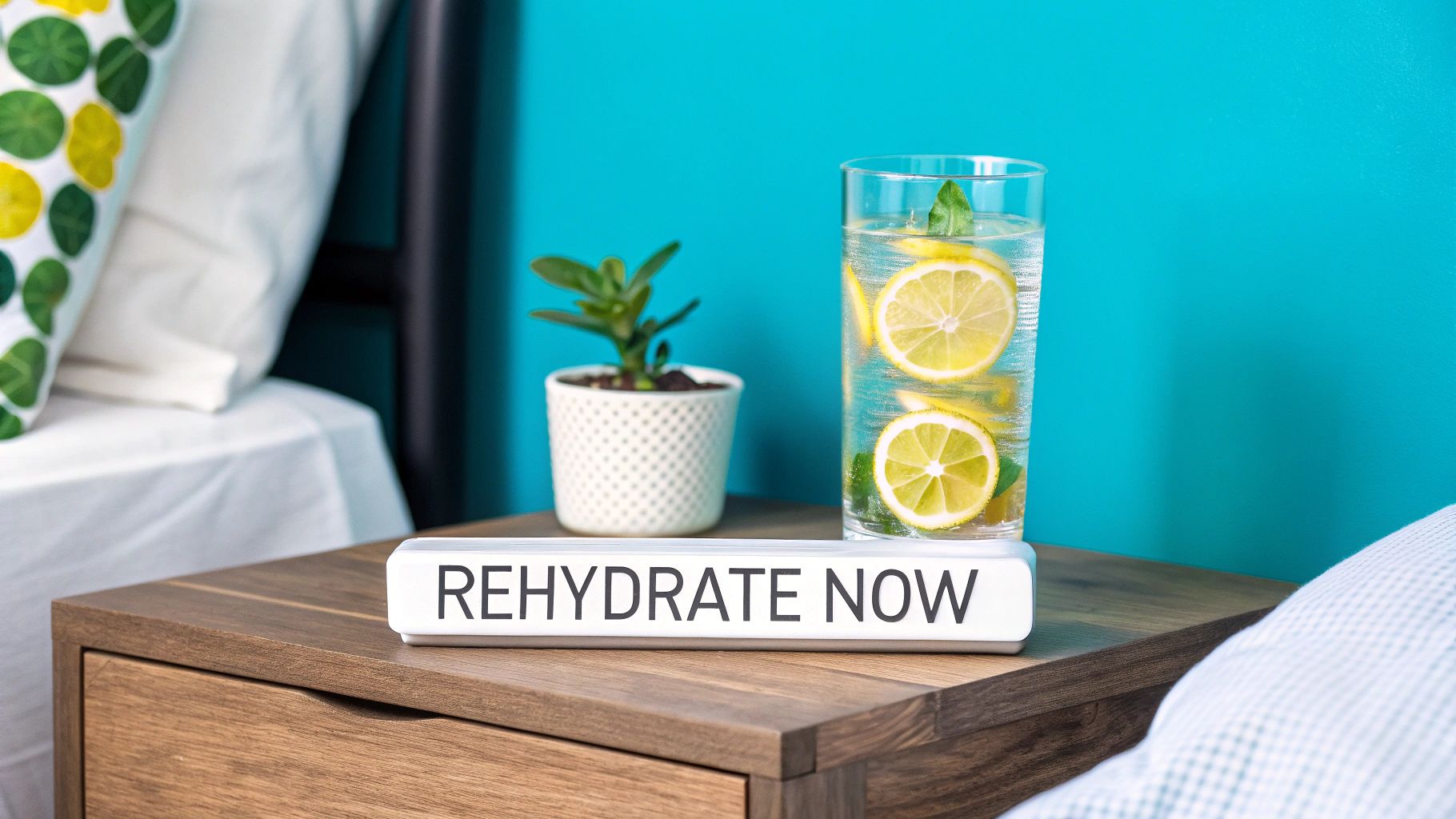
Knowing the science behind dehydration after alcohol consumption is half the battle. Now, let's build your defense. A smart recovery plan isn't about scrambling for damage control the next morning—it's a proactive strategy that kicks in before you even take your first sip.
Think of it as a three-part mission: prepare, maintain, and restore. When you support your body at each of these stages, you seriously lighten the load of processing alcohol and bouncing back from a night out. It’s less about finding a magic cure and more about giving your body the right tools to do its job.
Before You Go Out: The Pre-Hydration Phase
Your recovery actually starts hours before the party does. Showing up to a night out already dehydrated is like starting a marathon with an empty water bottle. You’re just setting yourself up for a rough time. The goal here is to create a solid hydration buffer.
- Hydrate All Day: Don't just chug a huge bottle of water right before you leave. Sip on water consistently throughout the day to get your body properly topped up.
- Eat a Real Meal: Food acts as a buffer, slowing down how quickly your body absorbs alcohol. A balanced meal with some healthy fats, protein, and carbs is your best friend. Never, ever drink on an empty stomach.
- Get Proactive: This is the perfect time to bring in reinforcements like an Upside Hangover Stick. Taking one before you start drinking loads your system with liver-supporting DHM, electrolytes, and key vitamins, essentially prepping your body for what’s coming.
During the Night: Smart Hydration Tactics
Okay, you're out and having fun. Now the name of the game is maintenance. It's super easy to forget about water when the good times are rolling, but this is the most critical window for preventing that massive fluid loss.
The rule of thumb is simple: for every alcoholic drink you have, have a full glass of water. This one habit is a game-changer. It works in real-time to counteract alcohol’s diuretic effect, keeping your fluid levels from totally bottoming out.
This simple trick also helps dilute the alcohol in your system, giving your kidneys a much-needed break from flushing out all your body's precious water reserves.
The Morning After: The Restoration Protocol
Even if you did everything right, you'll still need to focus on recovery the next day. The morning after is all about aggressive rehydration and topping up your depleted nutrients. And while water is a must, it's often not enough on its own.
Your body is screaming for electrolytes—minerals like sodium and potassium that got flushed out with all that extra urination. These are non-negotiable for restoring fluid balance and getting your muscles to function properly. For a deep dive, you can check out the best way to rehydrate after drinking with our proven science-backed tips.
This is where a targeted, scientifically formulated solution makes all the difference. An Upside Hangover Stick delivers a precise dose of electrolytes that helps your body actually absorb the water you’re drinking. Throw in ingredients like DHM to help process those nasty alcohol byproducts and B vitamins to kickstart your energy levels, and you have a complete system for bouncing back and feeling human again.
Why Water Alone Isn’t Enough for Recovery
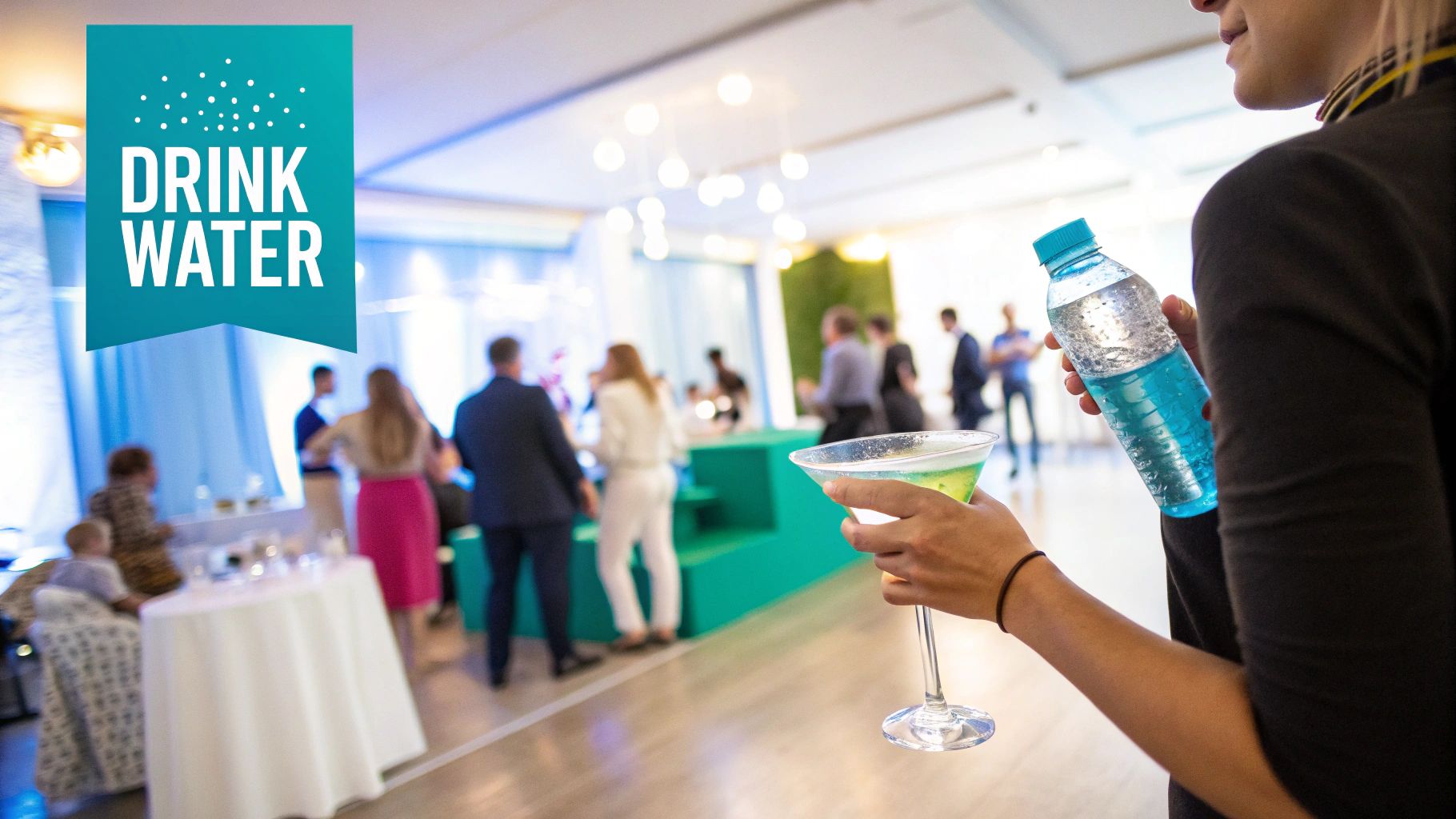
Chugging glass after glass of water the morning after a night out feels like the most logical thing to do. You’re thirsty, you know you’re dehydrated, and water seems like the obvious answer.
And yet, hours later, you might still feel foggy, weak, and a long way from 100%. The reason? True recovery from dehydration after alcohol consumption requires more than just H2O.
Think of it like this: an athlete doesn’t just down plain water after a tough game. They’re reaching for a sports drink packed with electrolytes. That's because they didn't just sweat out water; they lost crucial minerals that are essential for muscle function and fluid balance. A night of drinking puts your body through a similar (though very different) kind of marathon.
When alcohol makes you pee constantly, your body isn't just flushing out water. It’s also getting rid of critical electrolytes like sodium and potassium. These minerals are basically the gatekeepers of hydration—they’re in charge of directing water into your cells where it’s actually needed.
The Electrolyte Equation
Without enough electrolytes in your system, drinking a ton of plain water is surprisingly inefficient. A lot of that water just passes right through you without ever being properly absorbed, failing to rehydrate you on a cellular level.
It’s like trying to fill a leaky bucket. You keep pouring water in, but it’s not staying where it needs to be.
Research shows that a typical night of heavy drinking can lead to a fluid deficit of 1 to 1.5 liters of body water. That’s a huge loss, and it almost always comes with a drop in sodium and potassium, which directly contributes to those awful symptoms like muscle cramps and fatigue.
This electrolyte imbalance is a major reason why you still feel so drained even after drinking plenty of water. Your body is missing the key ingredients it needs to actually manage and use the fluid you’re giving it.
Restoring True Balance
To genuinely rehydrate, you need a solution that restores both fluids and those lost electrolytes. This is where a balanced approach makes all the difference.
Here’s what your body is desperately crying out for:
- Sodium: This is the main electrolyte that manages fluid balance outside of your cells. It's also critical for nerve function and muscle contractions.
- Potassium: Working with sodium, potassium handles fluid levels inside your cells. It’s a big deal for maintaining a steady heart rhythm and stopping muscle cramps in their tracks.
By putting these key minerals back into your system, you help your body get a handle on its hydration status again. If you're curious about the nitty-gritty, you can learn more about what electrolytes are and why they're so important.
Choosing a recovery aid with a targeted blend of these nutrients gives your body the tools it needs to absorb fluid effectively, helping you feel truly replenished, not just waterlogged.
Got Questions About Alcohol Dehydration? We've Got Answers.
When it comes to the link between booze and hydration, there's a lot of "common knowledge" floating around that totally misses the mark. You've got questions, we've got the real, science-backed answers.
Let's clear the air on some of the biggest myths and get you the info you actually need. This way, you can stop just reacting to a rough morning and start being smarter about your recovery from the get-go.
Does Beer Dehydrate You Less Than Liquor?
You'd think so, right? Beer is mostly water, after all. But this is a classic misconception. While a beer has way more water than a shot of tequila, the diuretic effect—that’s the fancy term for making you pee more—comes down to one thing: the total amount of alcohol you drink.
It doesn't matter if it's beer, wine, or liquor. A bunch of lower-alcohol beers can easily make you lose just as much fluid as a few strong cocktails. The key is your total ethanol intake, period. No matter what's in your cup, the best move is always to alternate with water.
Can I Just Chug Water Before Bed to Prevent a Hangover?
Slamming a big glass of water before you hit the hay is a good start, but it’s no magic bullet. The party doesn't stop for your kidneys just because you've called it a night. Alcohol’s diuretic effect can keep going for hours while you're fast asleep.
That means even if you tuck yourself in feeling hydrated, your body can still be losing crucial fluids and electrolytes all night long. Plus, a true hangover is a triple-threat of dehydration, inflammation, and other metabolic mayhem that water alone just can't fix.
A much better game plan? Hydrate throughout the night, and more importantly, give your body back the electrolytes it lost with something actually designed for recovery.
Are Sports Drinks Good for a Hangover?
We get why people reach for them. Sports drinks are definitely a step up from plain water because they have electrolytes. But here’s the thing: they were created to replace what you lose from sweat during a workout, not what you lose from a night of drinking.
They're often packed with sugar and don't have the right mix of minerals your body is screaming for after alcohol. A dedicated recovery product is built differently. It's got the specific blend of electrolytes, vitamins, and liver-supporting ingredients (like DHM) to tackle the unique mess a hangover leaves behind.
How Long Does It Actually Take to Rehydrate After Drinking?
Honestly, it depends on how hard you went and what you're doing to recover. For a night of moderate drinking, it can take anywhere from 12 to 24 hours of sipping fluids and electrolytes to get your body back in balance.
But you can definitely speed things up. Using a balanced oral rehydration solution—one with the right ratio of sodium, potassium, and other essentials—helps your body absorb and hold onto water way more effectively than just chugging H2O. It’s a targeted approach that helps you feel human again, much faster.
Don't let the fear of the morning after hold you back from living in the moment. With Upside, you get a scientifically formulated, great-tasting jelly that’s packed with DHM, electrolytes, and vitamins to help you party smarter and recover faster.
Ready to make your next night out a better one? Visit https://enjoyupside.com to get your Upside Hangover Sticks today!
#upside #enjoyupside #upsidejelly #livemore #hangovercure #hangoverprevention #fighthangovers #preventhangovers #HangoverRelief #MorningAfter #PartySmarter #HydrationStation #WellnessVibes #RecoverFaster #NoMoreHangovers #HealthyParty #HangoverHacks #FeelGoodMorning #NightlifeEssentials #HangoverFree #SupplementGoals #PostPartyPrep #GoodVibesOnly #HealthAndParty #HangoverHelper #UpsideToPartying
